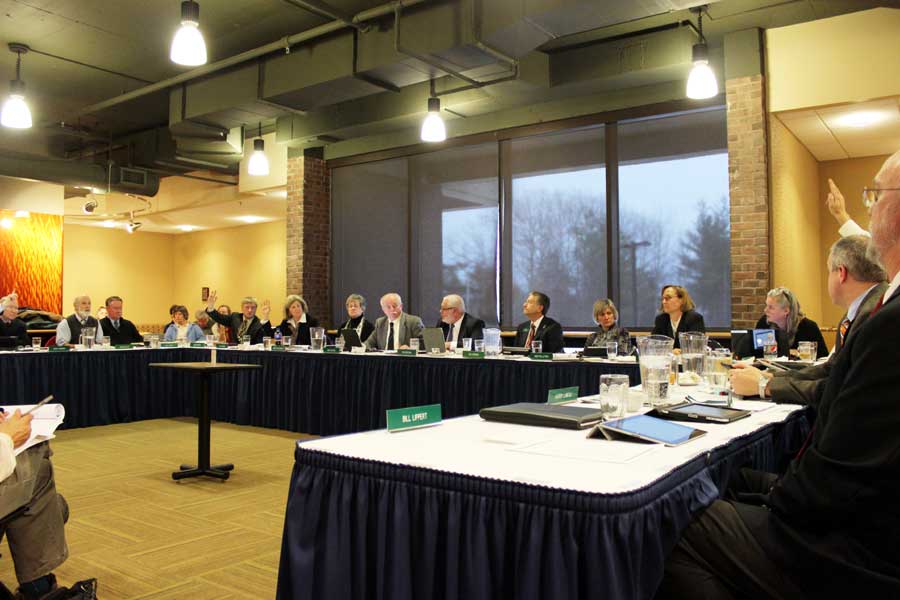VSC board of trustees approves 1-year, 3 percent tuition hike
The Vermont State Colleges’ board of trustees vote on whether to increase or freeze tuition at the trustee meeting Feb. 20 in Stearns Performance Space.
At the Vermont State College board of trustees meeting Thursday, Feb. 20, trustees approved a 3 percent tuition increase for the 2014-2015 academic year, rejecting a recommendation from its own Finance and Utilities committee, which voted 4-2 last week for a tuition freeze.
The 8-5 vote to approve the 1-year increase followed a 50-minute discussion that led to the defeat of three other resolutions, which included a proposal for a one-year, zero-percent increase, also known as a tuition freeze; a 2-year, 3 percent increase proposed by VSC Chancellor Tim Donovan; and a proposal made by student-trustee Colin Santee for a 1-year, 2 percent increase.
“It’s been said that we need to shift the cost burden from the students to the state,” said Martha O’Connor, chair of the Finance and Facilities Committee. “I don’t disagree with that. It’s true, but it’s not going to happen instantly. In the meantime, we must maintain the quality of education provided by our colleges for our present students and those we hope will come here in the future. So, at this point I’d like to dedicate our time to finding funding sources. We all need to work together, respectfully and thoughtfully.”
O’Connor supported the college presidents’ and Chancellor Tim Donovan’s original proposal for a 3 percent tuition hike for two academic years, but it was met with opposition by others who didn’t want to commit to a 2-year hike.
She later agreed with opponents on a 1-year hike, but urged them to come to a consensus on the long-term finances, and to seek other sources to fund the system.
Everyone agreed that the state government would not be a valid source as it hasn’t been doing enough for the state colleges in terms of funding for years.
Lynn Dickinson, who supported the tuition freeze, said she has a bias on the subject as she put herself through college. “I went to work at a psychiatric hospital, and I went every two weeks to the business office to take out money needed for cab fare and my shampoo. I had a roof over my head and enough food on the table, but for most of the year I took the extra money from that paycheck every week and budgeted to pay off loans so I could take my exams in May.”
Dickinson said she supported the tuition freeze because it would send a strong message, and would give students a chance, for one year, to hold their own.
Karen Luneau said the tuition freeze would be “attention getting,” but it would cause a tailspin for each of the schools. She said the trustees need to make an honest assessment of the VSC system, and consider what their mission is. Then they must decide what parts of the system no longer fit the mission and require further assessment.
“We can’t put these systems into a tailspin. I think the momentary glory and attention that would hit the VSC would be short lived,” she said. “Of course it’s too much, nobody wants to pay even five cents more for anything, but it’s always too little as well. The state has been irresponsible in underfunding us. We either get it from the state, or we get it from the students.”
Michelle Fairbrother said that neither a tuition increase nor a tuition freeze would solve the financial problems the VSC is currently facing. “It’s not meant to penalize the Vermont State Colleges, penalize the presidents, students, or the VSC system, but I truly believe it’s time for a change,” she said.
Before the final vote, the chancellor said that he believed they were back on the topic of the message that a specific vote would send, rather than the impact the vote would have on the colleges. “I think that we had an agreement to go one year instead of two, and I think that’s what we need to do,” he said. “I don’t think that a 2 percent increase would have the net effect of what we need to do, though.”
Under the resolution finally adopted, tuition will rise on average 3 percent for the 2014-2015 academic year for in-state and out-of-state students within the VSC. For in-state students at Johnson State College, that means an increase of $288, from the current $9,312 to $9,600.
At the end of the meeting, when the public was allowed to comment, Johnson State College student Liz Beatty-Owens expressed concerns that the increase would present a hardship for students and some will be unable to return due to the rising cost. She urged the board of trustees to work with students toward a better, self-sustaining solution for everyone.
Kayla served as a general assignment reporter and photographer for the spring 2013 semester. She returned for the Fall 2013 and spring 2014 semesters...



